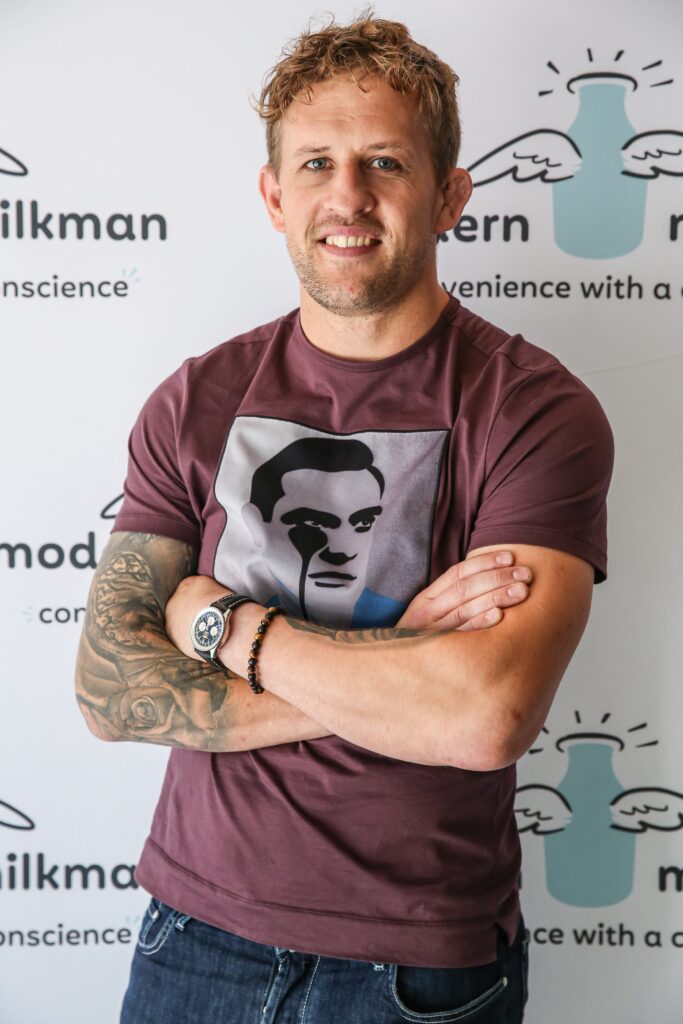
INTERVIEW
Simon Mellin
The Modern Milkman
It’s easy to romanticise the way things used to be done, like the milkman doing their daily dairy round. It was wholesome as well as sustainable, glass bottles collected and refilled, not simply thrown away to clog the oceans.
But the milkman never thought about being sustainable. The reason dairies started delivering was that it was more convenient for their customers. Once shoppers could store milk in fridges and plastic cartons, the model all but died.
Simon Mellin was all too aware of this, when he bought a milk float to serve residents of Colne, Lancashire, in 2018. A serial entrepreneur who’d worked in the food industry since his youth, founding a free range chicken farming business and a firm that packed food for online retailers like HelloFresh and Gousto, he knew that milkmen visited barely 2% of households, the number declining every year.
But he also believed that customers would choose a sustainable refill option if he could find a way of making it convenient again.
“Everyone’s got conflicting priorities in life, so you’ve got to make these things easy. That’s what The Modern Milkman is for, to enable the customer to be more sustainable,” Mellin explains.
The milk float was only ever for research purposes, Mellin taking orders, delivering, learning the pain points of traditional dairy delivery so he could design something fit for the 21st century.
In 2019, he launched The Modern Milkman as a technology platform. In some respects it closely resembled the milk round of old, even using the same bottling machines, which have seen little to no innovation in decades.
But unlike its traditional counterparts The Modern Milkman also allows customers to make and amend orders easily, and pay online without having to fish for cash, while optimising routes and small-batch logistics for its self-employed drivers and bottling partners.
Surging growth
With seed funding in place, the business began to scale, particularly around Manchester and Leeds, growing a fleet of branded delivery vans (“you wouldn’t miss a Modern Milkman van if you saw one, though we do deliver at night. You don’t want to think your house is being burgled at 3am – it’s just the milkman”).
The business started offering a wider range of products too – juices, baked goods and other daily produce where reusable packaging was feasible – and began to get media attention. A visit from then-PM Boris Johnson, who got stuck in a fridge with Mellin while trying to escape the press, didn’t hurt.
Covid lockdowns marked an inflection point, with year-on-year turnover growth reaching 1,222% in 2020.
“When you’re growing at that pace, you’re just holding on. You’re not driving it, it’s driving you, so it’s about doing the best job you can,” Mellin recalls. He credits a lot of the growth with marketing before the pandemic, growing awareness among consumers who would later turn to online groceries.
Word of mouth was particularly important, in part because the business works far more efficiently when there are 20 customers on a street than when there’s one. “The virality of it is a really powerful tool, along with the nostalgia. It’s friend to friend, neighbour to neighbour,” Mellin says.
He also points to another benefit of the lockdowns: the surprising ease with which The Modern Milkman found new drivers. “There were lots of furloughed people who wouldn’t normally dream of working a milk round, but who wanted to do something to help the community. That really helped enable growth.”
The business kept expanding in 2021 and 2022, with sales increasing 209% and 84% respectively, helped by several funding VC rounds totalling £50 million. True to its sustainability principles, it also became a certified B Corp.
But the period of inflation and interest rate hikes after Russia’s invasion of Ukraine posed difficulties. While Modern Milkman continued to grow, cost control became important, and it switched focus from growth to profit
“With aggressive growth come aggressive losses as you invest in expansion. If there’s a poor outlook, do we think we can fundraise enough to keep going for two or three years, at a sensible valuation? When [the answer becomes no], you adjust your operating principles,” he says, pointing out that the UK business is now profitable, and the wider group is not far from breaking even.
Going to America
Since the beginning of 2024, this wider group has included a business in the US, covering Connecticut, Rhode Island and Massachusetts.
It came about in a rather unusual way. Mellin discovered that an American dairy farmer, Seth Bahler, had registered modernmilkman.com at around the same time as he registered the .co.uk address.
They started talking and learned they shared values and objectives, and had complementary skills – Bahler’s business had supply chain and local knowledge, while Mellin’s had the technology. After a brief partnership, the UK business acquired its US namesake in January 2024, with Mellin relocating to the US to help supercharge growth.
“The fact that we could bring in a team who understood the market, who we could work well with – the stars aligned. And that’s enabled us to start scaling in the US very efficiently. If you think of the scale and wealth of America, we could build a very big business,” Mellin says of the acquisition, adding that The Modern Milkman is planning to enter New York shortly.
Growth in the UK continues to be a priority too, both expanding the core product range to other small batch, staple groceries, and expanding geographically, with the potential for two or three times more coverage.
Looking further ahead, Mellin wants to zero in on collections. “Everyone’s got a draw full of old chargers and phones, and they’re full of lithium and copper. These can all be turned into value,” he says.
“What we want to be is a platform that enables people to be more sustainable. That could mean lots of different things in lots of different ways.”

